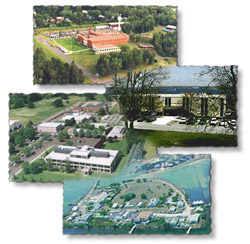Associate Director for Ecology

The Associate Director for Ecology (ADE), reporting to the National Laboratory Director, has delegated authority to act for the National Director on ecology-related science issues and to represent the National Director in his absence on these matters. The ADE is responsible for scientific leadership in the ecology effects research program. The mission of EPA in protecting the integrity of our ecosystems has remained a centerpiece of Agency business over three decades, although the nature of the environmental threats to our natural resources have changed over time. As the threats change from localized point source problems involving human wastes and toxic chemicals to global and non-point source problems associated with many human activities, the scientific needs for carrying out the Agency mission also change significantly. In addition to managing planned research to support existing regulatory timelines, the ecological effects program must address new and emerging problems and technologies. Working with the NHEERL scientific leaders, the ADE develops the strategic directions for the ecology effects research program to meet these challenges. There are four research Divisions that combine efforts under the ADE to meet the research goals for ecological effects research at the Laboratory, each based geographically to study effects on our diverse National ecosystems: the Atlantic Ecology Division in Narragansett, Rhode Island; the Gulf Ecology Division in Gulf Breeze, Florida; the Mid-Continent Ecology Division in Duluth, Minnesota; and the Western Ecology Division in Corvallis, Oregon. The ADE is responsible for planning, developing, organizing, directing and implementing a number of national research programs for which the NHEERL has Agency-wide responsibility. The ADE is responsible for representing the NHEERL on Agency committees for the purpose of assessing the relevance of ongoing research and to plan future approaches and emphasis. In addition, the ADE actively participates on interagency, national and international committees or panels to ensure that NHEERL research remains on the cutting edge and to share EPA research findings with the world scientific community. Atlantic Ecology Division (Narragansett, RI) studies the effects of contaminants and other stressors on the coastal waters and watersheds of the Atlantic seaboard. Gulf Ecology Division (Gulf Breeze, FL) assesses the condition of coastal ecosystems (wetlands, bays, estuaries, and coral reefs) in the Gulf of Mexico and analyzes causes of change to ecological status.
performs research to protect freshwater ecosystems and wildlife and to understand the basic processes and mechanisms involved in aquatic toxicity. Western Ecology Division (Corvallis, OR) evaluates the effects of chemical contaminants, land use, and global climate change on terrestrial ecosystems and on watershed ecology along the Pacific coast. The ADE also manages the Environmental Monitoring and Assessment Program (EMAP) which develops the science of monitoring the health of our natural resources. EMAP is also focussed on transferring this science to the states for use in their 305(b) reporting and as a guidance to inform their 303(d) listing for the Clean Water Act. In partnership with states and EPA Regions EMAP has tested its approach in the Mid-Atlantic Region and is now reducing the uncertainties associated with national application by working in 12 Western States. EMAP is also in the process of demonstrating outcome based monitoring in all 24 marine coastal states through the National Coastal Assessment. |
![[logo] US EPA](https://webarchive.library.unt.edu/eot2008/20081106181555im_/http://www.epa.gov/epafiles/images/logo_epaseal.gif)